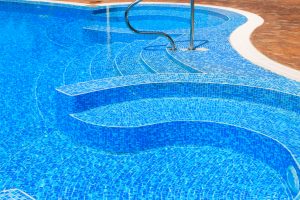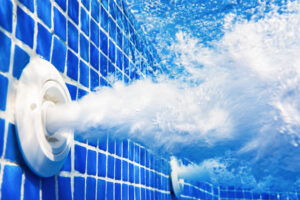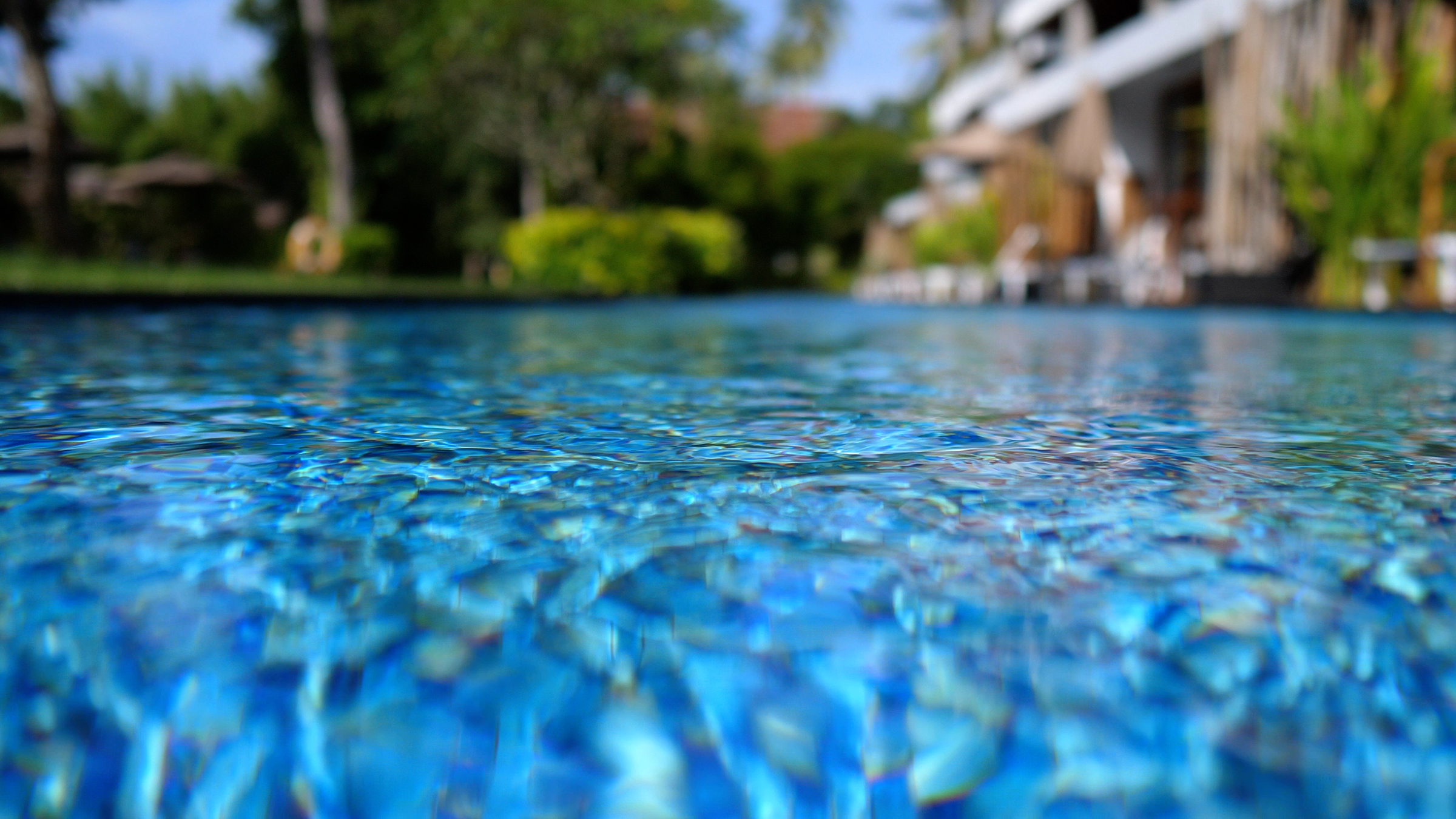Understand the Science Behind Salt Water Pool Systems

Table of Contents
- 1 Understand the Science Behind Salt Water Pool Systems
- 2 Planning for Spring Pool Renovations
- 3 The Science Behind How Salt Water Pool Systems Work
- 4 How Chlorine Sanitizes Pool Water
- 5 Benefits of Salt Water Pool Systems
- 6 Considerations with Salt Water Swimming Pools
- 7 Common Myths About Salt Water Pools
- 8 Is a Salt Water Pool Right for You?
- 9 Consult with Swimming Pool Professionals
Beyond the science, salt water pools provide a softer swimming experience, reduced chemical handling, and easier maintenance—making them a popular choice for homeowners looking to enhance their pools. If you’ve always wondered exactly how salt water pool systems work, now is the perfect time to learn the benefits and see if you’re ready to take the plunge to saltwater pools.
Planning for Spring Pool Renovations
As the colder months set in, pool owners often find themselves reflecting on how to enhance their pool experience for the next swimming season. One popular upgrade to consider is transitioning to a saltwater pool system.
Saltwater pools have gained popularity for their ability to provide consistent, automated chlorine generation, creating a softer and more enjoyable swimming experience. These systems not only reduce the need to manually add chlorine but also help maintain water clarity and balance more efficiently. Salt water systems offer a compelling alternative for pool owners looking to simplify pool upkeep while enhancing water comfort, and address the maintenance challenges of traditional chlorine pools.
If you’re considering this upgrade, now is the time to explore the science behind saltwater pool systems and decide whether it’s the right fit for your pool. Understanding how saltwater pool generators work will help you make an informed decision and prepare for a seamless transition.
 The Science Behind How Salt Water Pool Systems Work
The Science Behind How Salt Water Pool Systems Work
Saltwater pool systems rely on advanced technology and chemistry to sanitize water effectively and reduce the need for manually adding chlorine. At the heart of this process is electrolysis, a chemical reaction that uses a low voltage electric current to convert dissolved salt into chlorine. Understanding how this works involves breaking down the molecular structure of salt, the role of electricity, and how these elements combine to produce safe, clean pool water.
Electrolysis Process
Electrolysis is the key process in saltwater pool systems. It occurs when a low-voltage electric current is applied to salt water as it passes through the system’s generator. This electric current facilitates a chemical reaction that breaks down the salt (sodium chloride) into its components: sodium (Na⁺) and chloride (Cl⁻) ions.
In this reaction, the chloride ions are oxidized at the anode (positive electrode), producing chlorine gas (Cl₂). The chlorine gas dissolves in the water, forming hypochlorous acid (HOCl) and hypochlorite ions (OCl⁻)—the same active sanitizing agents found in traditional chlorine pools. These compounds effectively kill bacteria, algae, and other contaminants, ensuring the pool water remains safe and clear.
Molecular Structure of Salt (Sodium Chloride)

Salt, or sodium chloride (NaCl), plays a vital role in the process. When salt dissolves in water, it separates into sodium ions (Na⁺) and chloride ions (Cl⁻). These ions are freely available in the pool water, making them accessible for the electrolysis process.
The chloride ions are crucial because they serve as the raw material for chlorine production. Without them, the electrolysis reaction could not occur. Meanwhile, the sodium ions remain in the water, maintaining its salinity. This balance allows the system to recycle the salt, requiring only occasional replenishment to replace losses from splash-out, backwashing, or evaporation.
Role of Low Voltage Electric Current
The low-voltage electric current in a salt water pool system drives the electrolysis reaction, converting chloride ions into chlorine gas. This current is applied through the system’s salt cell, which contains electrodes submerged in the salt water.
Here’s how the process works step-by-step:
- Chloride Oxidation: At the anode, chloride ions lose electrons and are oxidized into chlorine gas (Cl₂).
- Chlorine Gas Dissolution: The chlorine gas dissolves in water, forming hypochlorous acid (HOCl) and hypochlorite ions (OCl⁻).
- Sanitization: Hypochlorous acid is the primary disinfectant, breaking down and destroying bacteria, viruses, and other harmful contaminants.
The efficiency of this process is why salt water pool systems can maintain consistent chlorine levels with minimal manual intervention. Additionally, because the salt is not consumed in the process, it is continuously recycled, making the system cost-effective and environmentally friendly.
Understanding the science behind salt water pool systems highlights their efficiency and innovation. By leveraging electrolysis, the molecular properties of salt, and the controlled application of electric currents, these systems provide a reliable and sustainable way to keep pools sanitized and safe.
Guide to Salt Water Chlorine Generators
How Chlorine Sanitizes Pool Water
Mechanism of Action
The sanitization power of chlorine in salt water pools lies in the formation of hypochlorous acid (HOCl) during the electrolysis process. Hypochlorous acid is a highly effective disinfectant that kills bacteria, viruses, and algae by disrupting their cellular functions. Here’s how it works:
- Penetration of Cell Walls: Hypochlorous acid is electrically neutral, which allows it to penetrate the cell walls of microorganisms more effectively than other disinfectants.
- Disruption of Cellular Processes: Once inside, hypochlorous acid disrupts the cell’s enzymes and proteins, effectively killing the microorganism and preventing reproduction.
This process not only ensures clean and safe water but also prevents the growth of harmful contaminants that can cause cloudy water, odors, or health risks. Chlorine also oxidizes organic matter, such as sweat, oils, and debris, keeping the pool hygienic.
Learn more about how chlorine works as a disinfectant: How Chlorine Keeps Pools Safe – Chemical Safety Facts.
Maintaining Water Balance
To ensure chlorine remains effective, it’s essential to maintain proper pH and chlorine levels in the pool.

- Optimal pH Range: The ideal pH range for pool water is 7.2–7.6. If the pH is too high, hypochlorous acid becomes less effective, reducing sanitization. If the pH is too low, the water can become overly acidic, irritating swimmers’ skin and eyes.
- Chlorine Levels: Maintaining a free chlorine level of 1–3 ppm (parts per million) ensures that the pool water remains sanitary without being overly harsh.
Regular testing and adjustments are crucial for keeping water chemistry balanced and avoiding problems like algae blooms, scaling, or irritation.
Benefits of Salt Water Pool Systems
Salt water pool systems offer several advantages over traditional chlorine pools, making them an increasingly popular choice among pool owners:
Consistent Chlorine Levels
Salt water systems automatically generate chlorine through electrolysis, maintaining a steady and consistent level of sanitization. Unlike traditional chlorine pools, where levels can fluctuate based on manual addition, salt water pools ensure balanced chlorine levels at all times, reducing the risk of under- or over-chlorination.
Reduced Maintenance
Because the system continuously generates chlorine, salt water pools require less frequent manual intervention. Pool owners no longer need to buy, store, or handle large amounts of chlorine. The reduced reliance on external chemicals simplifies upkeep, saving time and effort.
Enhanced Swimming Experience

Saltwater pools offer a more comfortable swimming experience. The water feels softer on the skin and is less likely to cause eye irritation or the strong “chlorine smell” often associated with traditional pools. Additionally, saltwater pools are gentler on swimsuits and hair, making them ideal for families or frequent swimmers.
With benefits like consistent sanitization, easier maintenance, and a more pleasant swimming environment, salt water pool systems are a smart upgrade for pool owners seeking convenience and comfort. Learn more about The Benefits of Salt Water Pools.
Considerations with Salt Water Swimming Pools
Initial Installation Costs
While salt water pool systems offer long-term savings, the upfront investment can be higher compared to traditional chlorine systems. The cost includes installing a salt water generator, which requires a specialized cell and control system. However, these costs are often offset over time due to reduced spending on chlorine and simplified maintenance.
Corrosion Concerns
The presence of salt in pool water can accelerate corrosion in certain materials, such as metal pool fixtures, handrails, and heaters. To mitigate this, pool owners can use corrosion-resistant materials and regularly monitor salt levels to ensure they stay within recommended ranges. Additionally, sacrificial anodes and specialized coatings can help protect sensitive equipment.
Maintenance Requirements
While saltwater pools require less manual chlorine addition, they still need regular maintenance. Pool owners must:
- Monitor salt levels and occasionally replenish salt.
- Periodically clean the salt cell to remove calcium buildup, which can hinder efficiency.
- Test water chemistry to ensure balanced pH and chlorine levels for optimal performance.
Guide to Salt Water Chlorine Generators
Common Myths About Salt Water Pools
Myth: Salt Water Pools Are Chlorine-Free
A common misconception is that salt water pools eliminate chlorine altogether. In reality, these pools generate chlorine through the process of electrolysis, creating the same sanitizing agents found in traditional chlorine pools. The difference lies in the automated and consistent production of chlorine, which reduces the need for manual handling.
Myth: Salt Water Pools Are Maintenance-Free
While maintenance is simplified, salt water pools still require regular upkeep. Monitoring salt levels, testing water chemistry, and cleaning the salt cell are essential tasks. Neglecting these can lead to poor system performance or water quality issues, such as algae growth or imbalanced pH.
Is a Salt Water Pool Right for You?
Deciding whether to switch to a salt water pool depends on your preferences, budget, and pool usage. If you value consistent sanitization, reduced chemical handling, and a more comfortable swimming experience, a salt water system might be the right fit. However, you should consider the initial installation costs and maintenance requirements when evaluating your options.
 Consult with Swimming Pool Professionals
Consult with Swimming Pool Professionals
Before making the switch, consult with pool professionals to assess your pool’s compatibility with a saltwater system. They can provide personalized recommendations and help you understand the specific costs and benefits of your situation.
The Swimming Pool Store offers quality salt chlorine generators, from top brands such as Pentair and Hayward.
Making the transition to a salt water pool system can be a game-changer for pool owners seeking convenience, comfort, and cost savings. By understanding the technology, benefits, and potential challenges, you can make an informed decision about whether this upgrade is right for your pool. Use the off-season to research, consult with experts, and plan for your renovation, ensuring a stress-free and enjoyable swimming experience in the coming season.
The Swimming Pool Store has been helping pool owners enhance their swimming experiences for over 55 years. From salt water pool systems to expert maintenance tips, we’re here to ensure your pool is safe, clean, and enjoyable. Contact us today to learn more about upgrading your pool and how a salt water pool system works.

